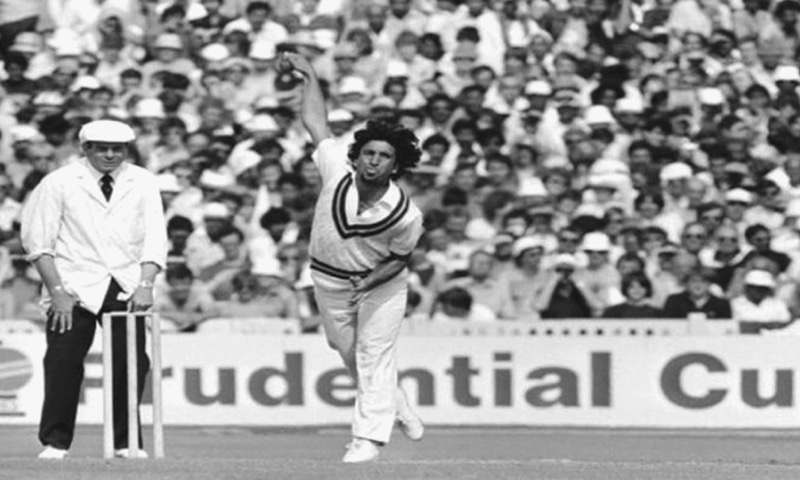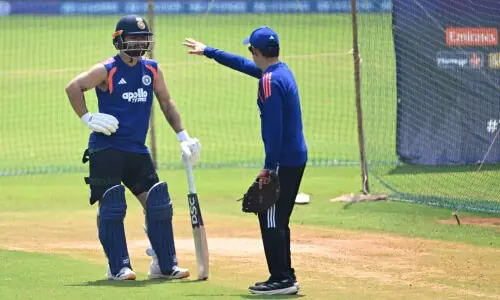The sudden death of Abdul Qadir has robbed not just Pakistan but the entire world of a true cricketing icon. The man rightly regarded as the ‘Father of Leg-spin Bowling’ in the modern age would have celebrated his 64th birthday today.
Coming from a humble background and being the son of maulvi, Qadir didn’t even own a pair of white trousers when he first started to play the gentleman’s sport. He bought his first pair from the Lunda Bazaar (secondhand clothes market) in Lahore.
After a low key Test debut in December of 1977, it took more than four years for Qadir to reinvent himself as the wily bowler blessed with a repertoire that hounded the opposition and left countless batsmen bamboozled and clueless in the longest format of the sport. To his sheer good luck, Qadir had a captain in Imran Khan who had tremendous faith in his abilities as a match-winner in Test cricket.
Abdul Qadir, who passed away on September 6, was not just a great cricketer and spin bowler. He was also a fine human being who believed in fairness and set high standards for himself
But there were also times during his career when both Imran and his first-choice spinner felt frustrated, chiefly because of the latter’s lean spells. For example, he found wickets hard to come in 1983-84, when Pakistan played their solitary five-Test series in Australia. Across those five matches, Qadir’s returns were a mere 12 wickets at a hugely disappointing average of 61.00 for the series, with a best of 5-166 at the Melbourne Cricket Ground.
The chief cause of his failings, according to him, were the sandy outfields of the Australian grounds. “I used to apply dry mud from the outfield to my fingers and use saliva to tighten my grip on the ball,” the late Qadir revealed in an interview some three years ago. “But due to the sandy soil, I wasn’t able to grip it and, until the final Test, [in Sydney which is traditionally known to be the friendliest venue for spinners] I was never in control of the ball. It was very frustrating, and my entire tour was a chaotic one.”
While Qadir was phenomenally successful against right-handed batsmen, particularly on familiar home territory where he snared 168 wickets in 40 Tests at 26.82 with 12 five-fors and four hauls of 10 or more wickets, his overseas trips were generally nightmarish — 68 wickets from 27 Tests at a relatively unhealthy return of 47.58 per victim. He also found left-handers a real struggle to deal with, and the likes of Graham Yallop, Wayne Phillips (during the 1983-84 Australia tour) and David Gower (when England visited Pakistan in the spring of 1984) were some examples of the suffering Qadir had to endure, despite being bestowed with two different types of googlies and a flipper that he delivered at the speed of medium-pacers.
OAK SAPLING
Wasim Bari, who was the Pakistan captain when Qadir debuted against England in 1977-78, vividly remembers the legendary bowler as someone who hated failures. “In his first match at the Gaddafi Stadium, although he bowled quite well, he did not get early wickets. Obviously, deep inside he was disappointed because he had set very high standards for himself,” Bari says.
“I consoled him by saying that the young sapling [that he was then] would definitely grow into a great oak tree. That lifted his spirits and, with time, he mastered the art of wrist-spin bowling when fast bowling was in vogue. And although his record speaks for itself [overall 236 wickets in 67 Tests at 32.80] I feel now, with regret, that Abdul Qadir was never given the appreciation that he so richly deserved as a cricketer. It is only after he has left us that we are honouring this great man with words of wisdom.”
FEARLESS BOWLER
There were times at the fag end of 1970s and early 1980s when Pakistan relied on their two Qs — Abdul Qadir and Iqbal Qasim, who were famously labelled the “spin twins”. And although they didn’t match the prolific deeds of the dreaded pace-bowling two Ws — Wasim Akram and Waqar Younis — they were still successful enough to be rated among the best bowling partnerships to take the field for the country.
Qadir and Qasim were paired 23 times in Test cricket — most of them together in 18 home fixtures — and their achievements were almost similar in terms of their averages. Slow left-armer Qasim averaged 24.97 (for his 86 wickets) to Qadir’s 25.79 (for his 98 wickets).
Speaking of his long association with Qadir, Qasim recollects: “There is no doubt about his greatness as a bowler, but whose friendship [with me] went deep into our post-retirement years. It was a great privilege to be bowling [in tandem] with Qadir because we understood our roles as if by telepathy. He bowled to star batsmen without any fear and, most of the time, he quickly hit the straps rather than take a while to settle down as leg-break bowlers often do. He was a true artist who perfected one of the most difficult arts of bowling. [He was] a real genius, the likes of which we’ll probably never see in times to come.”
Qadir also figured prominently in one-day cricket, taking 132 wickets from 104 One-day Internationals at a decent average of 26.16. Still, it took a lot of off-field convincing from the man himself before he became a potent wicket-taking option in the short format. He eventually made a dream ODI debut with figures of 4-21, after a match-defining innings of 41 during the 1983 World Cup clash against New Zealand at Edgbaston.
MAN OF PRINCIPLES
Saleem Jaffer, who played alongside Qadir during the late 1980s and who also worked under him in the national selection committee, rated him as a man of principles and self-belief.
The ex-Pakistan pace-man reminisces: “Qadir Bhai was definitely the most determined cricketer that I’d ever seen or played with. During the 1987 World Cup match against West Indies in Lahore, everyone had given up on Pakistan winning but him. We needed 16 runs from the final over and I was the last man in. The look on Qadir Bhai’s face was that of a man who meant business. Defeat was the last thing on his mind. He told me: ‘Jaff, we will win this one if you just stay and support me. Leave it to me to get the runs.’ And he did! The biggest tribute that we can all give him now is to remember him as a fearless person. He had huge amounts of convincing powers. Qadir bhai played ODI cricket after he challenged Imran Bhai that he would get him out [during practice], ()to win selection for the 1983 World Cup.
“When I was a member of the national selection committee, I found him accommodating as chief selector. Once he and Younis Khan [Pakistan captain in 2009] refused to speak with each other because of a disagreement over selection matters and I had to act as the mediator to break the deadlock. But there was never any issue of being egotistic on the part of Qadir Bhai. If he were, he’d never have given in to the rightful demands of the Pakistan captain. He was very, very kindhearted and respected the views of others,” recalls Jaffer.
Even in a fast-paced modern world, the legacies of Abdul Qadir the magician leg-spinner will continue to live on.
The writer is a member of staff
Published in Dawn, EOS, September 15th, 2019
































